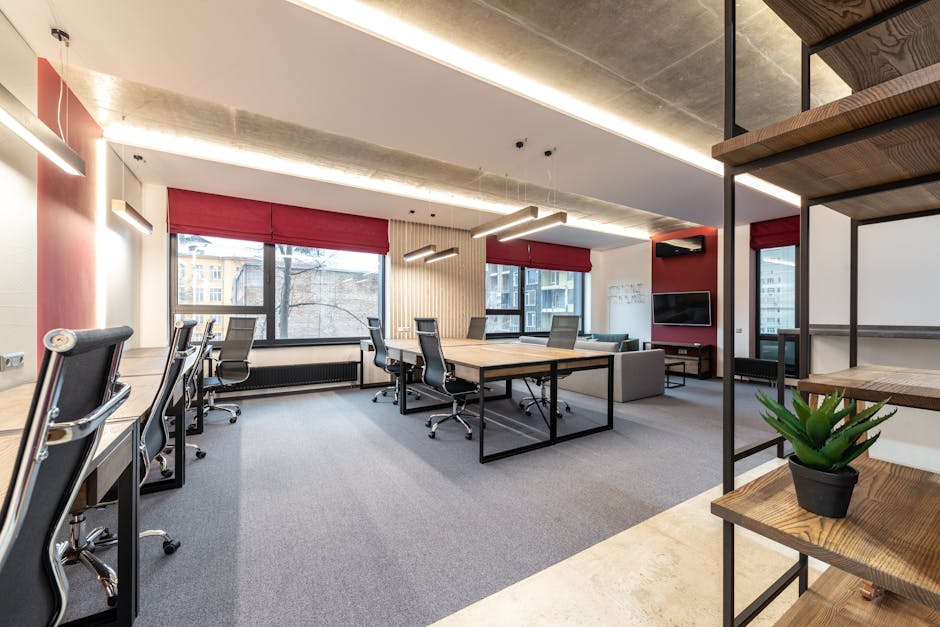The Future of Facilities Management: Embracing Automation, Data, and Sustainability
"Discover how the facilities management industry is evolving with automation, data analytics, and sustainability at its core. Learn about the challenges facing facility managers and the emerging trends that are redefining workplace environments for the future. "

The Evolving Landscape of Facilities Management
The facilities management industry is undergoing a significant transformation, driven by technological advancements, changing workplace dynamics, and a growing emphasis on sustainability. As we look towards the future, three key pillars are reshaping the field: automation, data analytics, and sustainability. These elements are not just trends but fundamental shifts that are redefining how we manage and optimize our workspaces.

Automation: Streamlining Operations
Automation is revolutionizing facilities management by taking over routine tasks and enabling more efficient operations. From smart building systems that adjust lighting and temperature based on occupancy to automated maintenance schedules, technology is freeing up facility managers to focus on more strategic initiatives.
Data Analytics: Informed Decision-Making
The power of data is transforming how facility managers approach their roles. With advanced analytics tools, it's now possible to gain deep insights into space utilization, energy consumption, and maintenance needs. This data-driven approach allows for more informed decision-making and proactive management of facilities.
Sustainability: A Core Focus
Sustainability in facilities management has moved from a nice-to-have to a must-have. Organizations are increasingly prioritizing green initiatives, not just for environmental reasons but also for cost savings and regulatory compliance. From energy-efficient systems to waste reduction programs, sustainability is becoming integral to facilities management strategies.
Challenges Facing Facilities Management
As the industry evolves, facility managers face several key challenges:
-
Technological Adaptation: Keeping up with rapidly advancing technology and ensuring staff are trained to use new systems effectively.
-
Balancing Sustainability and Efficiency: Implementing green practices while maintaining operational efficiency and cost-effectiveness.
-
Changing Workplace Dynamics: Adapting to flexible work arrangements and the need for more versatile, multi-use spaces.
-
Employee Well-being: Prioritizing health, safety, and comfort in facility design and management.
-
Data Security: Protecting sensitive information as facilities become more connected and data-driven.
The Proactive Role of Facilities Managers
The future of facilities management will see professionals taking on more proactive and strategic roles within their organizations. Facility managers will need to:
- Develop a broader skill set, including technology proficiency and data analysis capabilities.
- Collaborate closely with other departments, such as IT and HR, to create integrated workplace solutions.
- Stay ahead of industry trends and continuously innovate to meet changing needs.

Emerging Trends Shaping the Future
Several trends are already making their mark on the facilities management landscape:
Smart Buildings and IoT
Smart office spaces devices are becoming more common. These technologies enable real-time monitoring and control of building systems, leading to improved energy efficiency and occupant comfort.
Flexible Workspaces
The rise of remote and hybrid work models is driving the need for more flexible office environments. Facility managers are tasked with creating adaptable spaces that can accommodate changing work patterns and team sizes.
Health and Wellness Focus
In the wake of the global pandemic, there's an increased emphasis on creating healthy workplaces. This includes improved air quality systems, touchless technologies, and spaces designed to promote physical and mental well-being.
Predictive Maintenance
Advanced analytics and AI are enabling predictive maintenance strategies, allowing facility managers to address potential issues before they become problems, reducing downtime and costs.
Preparing for the Future of Facilities Management
To thrive in this evolving landscape, organizations and facility managers should:
- Invest in technology and training to stay ahead of industry trends.
- Develop comprehensive sustainability strategies that align with organizational goals.
- Foster a culture of innovation and continuous improvement.
- Prioritize employee experience and well-being in facility design and management.
- Build partnerships with technology providers and sustainability experts to leverage external expertise.

Conclusion
The future of facilities management is bright, filled with opportunities for innovation and improvement. By embracing automation, leveraging data analytics, and prioritizing sustainability, facility managers can create more efficient, comfortable, and environmentally friendly workspaces. As the industry continues to evolve, those who adapt and stay ahead of these trends will be well-positioned to lead their organizations into the future of work.
The transformation of facilities management is not just about adopting new technologies or practices; it's about reimagining the role of physical spaces in our work lives. As we move forward, the focus will increasingly be on creating environments that not only meet functional needs but also enhance productivity, foster collaboration, and support overall well-being. The facilities managers of tomorrow will be key strategists in shaping the workplaces of the future, driving innovation and sustainability at every turn.
Want to learn more about Workplace Analytics?
Explore our complete guide with more articles like this one.


